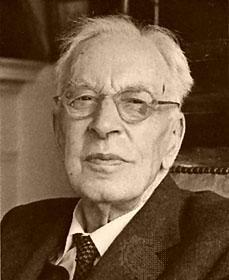
A generalist of vast erudition, Toynbee took a panoramic view of history at a time of increasing specialization. He saw the rise and decline of civilizations in spiritual terms when those he described as "would-be scientific historians" saw history in terms of biology, geography, and economics. Toynbee was criticized for his emphasis on religion and for sweeping theories often employing myth and metaphor as models and supporting evidence. A prolific writer, driven by "anxiety" and "conscience", his 12-volume A Study of History (1934-61) stands as his grand achievement.
Started in 1922 after Toynbee had absorbed Oswald Spengler's The Decline of the West (1918-22), when he observed Bulgarian peasants wearing fox-skin caps that may have resembled those worn by Xerxes' troops (as recounted in Herodotus), A Study of History presents history as the rise and - with one exception - fall of 26 societies, 21 of which are "civilizations", with the remaining 5 defined as "arrested civilizations". He classified civilizations according to cultural, often religious, rather than national criteria, insisting that "An intelligible field of historical study is not be found within a national framework"[2]. Toynbee's civilizations include the "Egyptiac", "Hellenic" (including Roman), "Hindu", "Sinic", and "Western Christian" civilizations, while the "arrested civilizations" include the Spartan, Eskimo, and Polynesian societies. In Toynbee's view, civilization arises only in response to some extremely difficult set of challenges, when "creative minorities" inspire unprecedented effort to solve the problems faced by the society. These challenges may be physical, as when the Minoans conquered the sea; or social, as when Athens reacted to the Persian onslaught. The cycle of civilization comprises two major phases: a "universal state", such as the Roman Empire, that arises out of a time of troubles; and an "interregnum" dominated by a higher religion and a "Volkerwanderung" (migration) of barbarians in a heroic age. To Toynbee, only Western Christian civilization was in a thriving state, the others having gone through the three stages of breakdown: 1) a failure of creative power in the creative minority; 2) the withdrawal of allegiance to the ruling minority on the part of the majority; and 3) the consequent loss of social unity. The cycle of rise and decline was not inevitable in Toynbee's view: he allowed the possibility that a civilization could continue to respond creatively and successfully to recurring hardships. This was partly a reaction to Spengler's "dogmatic and deterministic" view of history as a series of inexorable cycles of "organic" growth and decay.
Toynbee's spiritual perspective is evidenced in Civilization on Trial (1948), a collection of essays spanning 20 years. In "Christianity and Civilization" (1947), he challenged the conventional view of higher religion as an incubator or "chrysalis" of civilization between the peaks of secular societies. Toynbee proposed instead that the rise and fall of secular civilizations fed the constant rise of higher religions, notably Christianity: "The breakdowns and disintegrations of civilizations might be the stepping-stones to higher things on the religious plane"[3].
In later writings Toynbee was troubled by the impact of industrialization and technology on the social and physical environment. In Mankind and Mother Earth (1976), a narrative history of the world to 1973, Toynbee reflected on "the devastating effect of Man's impact on the biosphere" and the possibility of "a man-made catastrophe that would wreck the biosphere and would destroy mankind together with all other forms of life"[4]. He insisted, however, that the future is not determined by the past, and that instead of man's murdering Mother Earth, "he could redeem her by overcoming the suicidal, aggressive greed that, in all living creatures, including Man himself, has been the price of the Great Mother's gift of life"[5]. [This public domain biography was generously contributed to Malaspina Great Books by Richard Ganski.]
Notes:
[1] Civilization on Trial, Oxford University Press (1948), p.4 [2] Civilization on Trial, p. v [3] Civilization on Trial, p. 234 [4] Mankind and Mother Earth, Oxford University Press (1976), pp. 575 and 587-588 [5] Mankind and Mother Earth, p. 596
Books, Music, Art:
Civilization on Trial
Mankind and Mother Earth
Books, Music, Art:
Books from Amazon: Arnold Joseph Toynbee
Library of Canada: Arnold Joseph Toynbee
Library of Congress: Arnold Joseph Toynbee
Other Library Catalogs: Arnold Joseph Toynbee
Malaspina Canada Links: Arnold Joseph Toynbee
History Research Online at Questia
Modern History